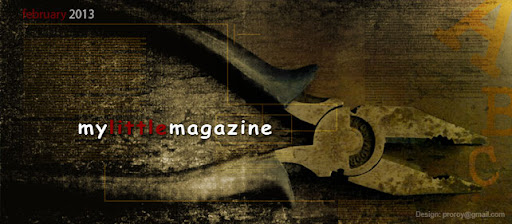By Prodipto Roy
Kolkata, India
Clouds rumbling in the sky; teeming rain.
I sit on the river bank, sad and alone.
The sheaves lie gathered, harvest has ended,
The river is swollen and fierce in its flow.
As we cut the paddy it started to rain.
One small paddy-field, no one but me -
Flood-waters twisting and swirling everywhere.
Trees on the far bank; smear shadows like ink
On a village painted on deep morning grey.
On this side a paddy-field, no one but me.
Who is this, steering close to the shore
Singing? I feel that she is someone I know.
The sails are filled wide, she gazes ahead,
Waves break helplessly against the boat each side.
I watch and feel I have seen her face before.
Oh to what foreign land do you sail?
Come to the bank and moor your boat for a while.
Go where you want to, give where you care to,
But come to the bank a moment, show your smile -
Take away my golden paddy when you sail.
Take it, take as much as you can load.
Is there more? No, none, I have put it aboard.
My intense labour here by the river -
I have parted with it all, layer upon layer;
Now take me as well, be kind, take me aboard.
No room, no room, the boat is too small.
Loaded with my gold paddy, the boat is full.
Across the rain-sky clouds heave to and fro,
On the bare river-bank, I remain alone -
What had has gone: the golden boat took all.
Rabindranath Tagore, 1894. Translated by Bhabani Bhattacharya.





.jpg)

.jpg)










